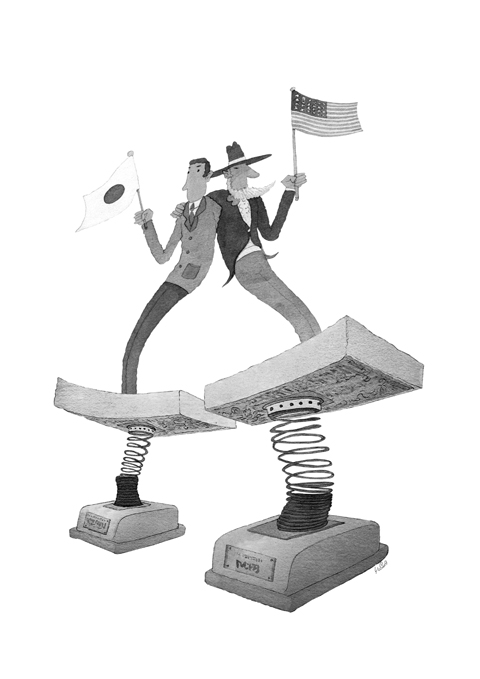Despite the impressive sounding diplomatic rhetoric of recent months, the alliance between Japan and the US is in the doldrums. It’s not so much that there are strains between Washington and Tokyo as that security relations are listless.
When US Secretary of State Hillary Clinton was in Tokyo in February, she said the alliance was “a cornerstone of our foreign policy.” Later that month, US President Barack Obama welcomed Prime Minister Taro Aso to the White House, saying: “The friendship between the United States and Japan is extraordinarily important to our country.”
The Japanese ambassador to the US, Ichiro Fujisaki, defended Japan’s contributions in an interview while visiting Hawaii in March.

“We are doing as much as we can,” he said, “in economics and diplomacy.”
He noted that Japan would host an international conference in Tokyo this month to promote economic aid to Afghanistan, where Japan is paying the salaries of 80,000 Afghan policemen for six months.
Out of the public eye, however, those engaged in maintaining the alliance pointed to several corrosive elements:
Since Prime Minister Junichiro Koizumi stepped down in September 2006, Japan has had three prime ministers — Shinzo Abe, Yasuo Fukuda and the incumbent, Taro Aso — and six defense ministers. Much of Koizumi’s initiative in the realm of security went out with him.
Japan must hold parliamentary elections by September, with both leading parties in disarray. Whether the ruling Liberal Democratic Party will retain Aso is unclear, nor has a front runner appeared to replace him. The leader of the opposition Democratic Party of Japan, Ichiro Ozawa, was once considered a frontrunner but has been losing ground steadily because of a financial scandal in his campaign contributions.
US officers, who are usually understanding of the political and budgetary constraints under which Japanese officers must operate, have privately become impatient.
“The Japanese didn’t pull their weight,” said one officer about Japanese troops opting out of Cobra Gold maneuvers alongside US, Thai and Singaporean troops in northern Thailand.
Japan has been slow, compared with China and European nations, to send warships to the Gulf of Aden to fend off pirates seeking to hijack cargo ships in that well-traveled waterway. Some Japanese officers have also expressed frustration with their political leaders for imposing restraints that the officers contend do not serve Japan’s national interest.
An exception has been missile defense, in which Japan has done more than other allies to invest in ships, sensors and computers, to train with US forces and to plan to respond to potential threats from North Korea and China.
In Washington, the president of the Center for Strategic and International Studies think tank, John Hamre, was quoted in the Japanese press as saying: “If Japan reduces its commitment to the alliance with the US, it needs to seriously face up to security challenges in the region.”
Hamre, an influential member of the US foreign policy “establishment,” said Japan would need to increase its defense spending to 3 percent of GDP, compared with 1 percent now.
He also said: “Japan will face the issue of nuclear arms … as there is a nuclear threat by North Korea and China.”
Noting that some Japanese, led by Ozawa, have called on the US to withdraw all but its naval forces from Japan, Hamre said: “The Navy alone, or the Air Force, or the Army alone will not create the fundamental security foundation.”
A withdrawal of US troops, he said, “would create a distance and a vacuum between the two nations.”
Richard Halloran is a freelance writer based in Hawaii.

There is much evidence that the Chinese Communist Party (CCP) is sending soldiers from the People’s Liberation Army (PLA) to support Russia’s invasion of Ukraine — and is learning lessons for a future war against Taiwan. Until now, the CCP has claimed that they have not sent PLA personnel to support Russian aggression. On 18 April, Ukrainian President Volodymyr Zelinskiy announced that the CCP is supplying war supplies such as gunpowder, artillery, and weapons subcomponents to Russia. When Zelinskiy announced on 9 April that the Ukrainian Army had captured two Chinese nationals fighting with Russians on the front line with details
On a quiet lane in Taipei’s central Daan District (大安), an otherwise unremarkable high-rise is marked by a police guard and a tawdry A4 printout from the Ministry of Foreign Affairs indicating an “embassy area.” Keen observers would see the emblem of the Holy See, one of Taiwan’s 12 so-called “diplomatic allies.” Unlike Taipei’s other embassies and quasi-consulates, no national flag flies there, nor is there a plaque indicating what country’s embassy this is. Visitors hoping to sign a condolence book for the late Pope Francis would instead have to visit the Italian Trade Office, adjacent to Taipei 101. The death of
The Chinese Nationalist Party (KMT), joined by the Taiwan People’s Party (TPP), held a protest on Saturday on Ketagalan Boulevard in Taipei. They were essentially standing for the Chinese Communist Party (CCP), which is anxious about the mass recall campaign against KMT legislators. President William Lai (賴清德) said that if the opposition parties truly wanted to fight dictatorship, they should do so in Tiananmen Square — and at the very least, refrain from groveling to Chinese officials during their visits to China, alluding to meetings between KMT members and Chinese authorities. Now that China has been defined as a foreign hostile force,
On April 19, former president Chen Shui-bian (陳水扁) gave a public speech, his first in about 17 years. During the address at the Ketagalan Institute in Taipei, Chen’s words were vague and his tone was sour. He said that democracy should not be used as an echo chamber for a single politician, that people must be tolerant of other views, that the president should not act as a dictator and that the judiciary should not get involved in politics. He then went on to say that others with different opinions should not be criticized as “XX fellow travelers,” in reference to